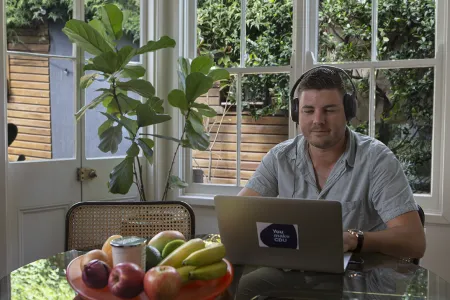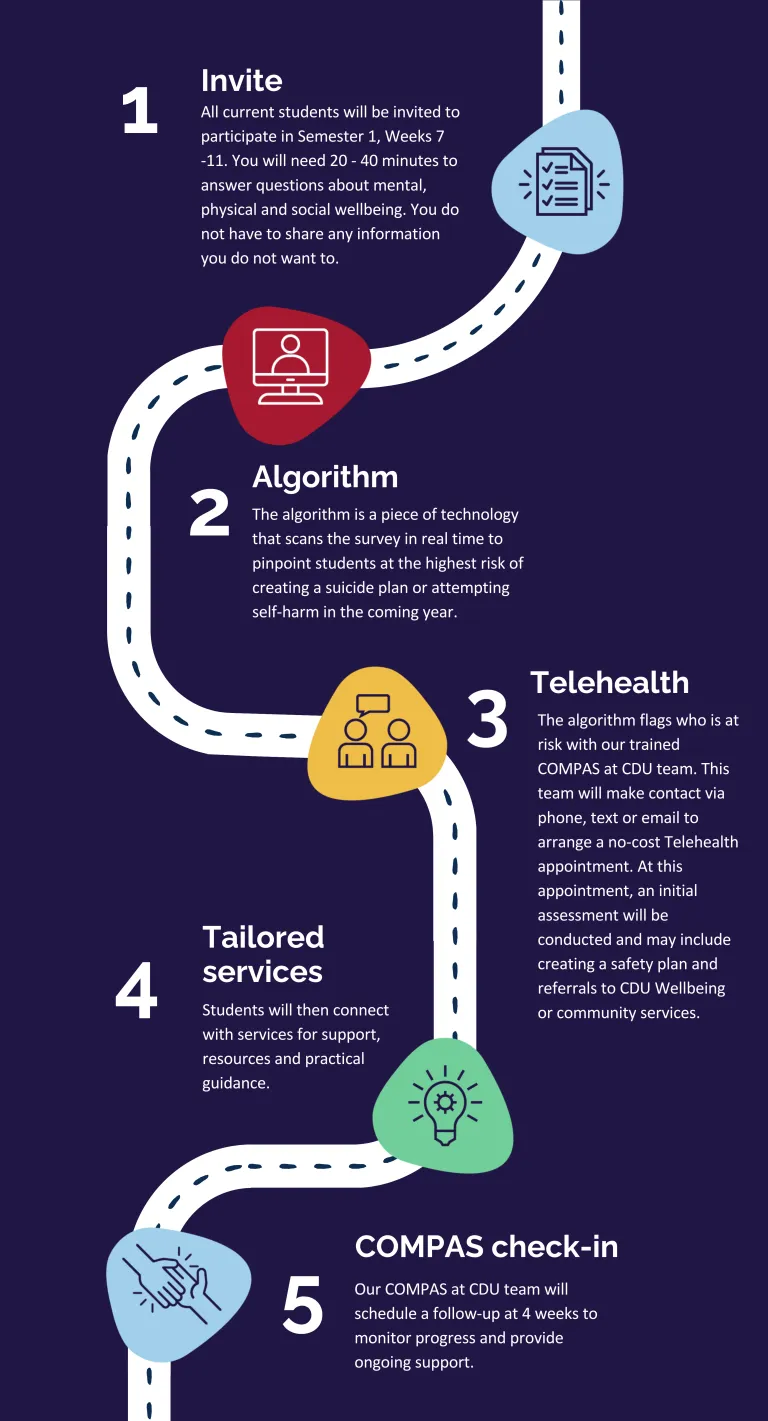Explore the COMPAS website for more details about the research project, additional resources and training support.
Did you know 1 in 3 university students have experienced poor mental health, including suicidal ideation? That's 238,000 students at Australian universities each year.
Given suicide remains the leading cause of death for young people (15 – 24) and adults (25 – 44) in Australia*, we are taking action.
Introducing COMPAS at CDU
COMPAS is a pioneer suicide prevention tool and mental health support program for universities.
Developed by researchers at Curtin University, COMPAS is a survey with an advanced predictive algorithm that can identify individuals at risk of suicide within the next 12 months; meaning we can pinpoint who needs support right now with 88% accuracy.
CDU is committed to improving early intervention and preventing crisis before it occurs. Through collaboration with Curtain University and the COMPAS research team, we can better identify who is at risk and provide hope to those in need.
How does COMPAS at CDU work?
Infographic content for screen readers
There is an image of a pathway with five steps to COMPAS at CDU.
- Invite - All current students will be invited to participate in Semester 1, Weeks 7 - 11. You will need 20 – 40 minutes to answer questions about mental, physical and social wellbeing. You do not have to share any information you do not want to.
- Algorithm - The algorithm is a piece of technology that scans the survey in real time to pinpoint students at the highest risk of creating a suicide plan or attempting self-harm in the coming year.
- Telehealth - The algorithm flags who is at risk with our trained CDU COMPAS team. This team will make contact via phone, text or email to arrange a no-cost Telehealth appointment. At this appointment, an initial assessment will be conducted and may include creating a safety plan and referrals to CDU Wellbeing or community services.
- Tailored services - Students will then connect with services for support, resources and practical guidance.
- COMPAS check-in - Our COMPAS at CDU team will schedule a follow-up at 4 weeks to monitor your progress and provide ongoing support.
Our COMPAS at CDU team
Our Master of Psychology students have been trained to provide initial assessment, referral and follow-up.
All phone calls, email and text conversations conducted by Master of Clinical Psychology trainees are supervised by a Senior Clinical Psychologist.
Did you know?
COMPAS is associated with a 41.7% reduction in suicidal behaviour one year later for identified at-risk students.
Frequently asked questions
What does COMPAS mean?
COMPAS is an acronym for Checking on Mental Health Providing Alternatives to Suicide. While not the traditional spelling, a COMPAS also symbolises direction and we are committed to helping our students head toward safety and wellbeing.
When does the survey close?
The Semester 1 2025 COMPAS survey is open until Wednesday 21 May 2025.
Do I need to complete the survey in one sitting?
No, your survey progress is saved. If you've already started COMPAS, you can pick up where you left off by clicking back into the survey.
How do you manage my survey data?
Survey responses are de-identified. Personal information is removed and replaced with random ID numbers. The data is stored securely and only accessible by the Curtain University COMPAS research team to improve the algorithm.
How does the COMPAS survey identify if someone is at risk?
The predictive algorithm uses a psychosocial assessment that can flag individuals at future risk of suicide or self-harm. No human reads your answers and makes that assessment. The tool is accurate 88% of the time.
What happens if I’m identified as high risk?
Students identified as high risk will receive contact from a COMPAS at CDU team member. Our team member will discuss your situation with you, provide referrals and create a safety plan. The COMPAS at CDU team are Master of Psychology (Clinical) students who are supervised by a Senior Clinical Psychologist.
What happens if I’m not identified as at risk, but still have concerns?
All students will receive a response from the survey. This response is based on the answers you provide and will include self-service tools and resources that could be valuable to your wellbeing. We’ll also include all of the student support services available to you.
CDU Wellbeing Support Line
If you or someone you know is in crisis or needs immediate support, please contact the CDU Wellbeing Support Line available 24/7 for immediate and confidential support.
Ph: 1300 393 933
SMS: 0488884144
References
*Australian Institute of Health and Welfare. (2025). Deaths in Australia, Leading causes of death. Australian Government. https://www.aihw.gov.au/reports/life-expectancy-deaths/deaths-in-australia/contents/leading-causes-of-death
Curtin University Human Research Ethics Committee (HREC) and Charles Darwin University HREC have both approved this study (HRE2024-0356, H25033).




